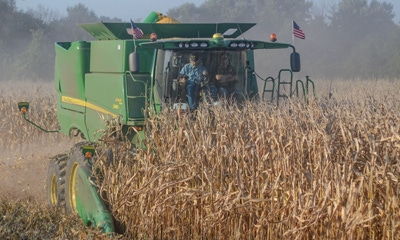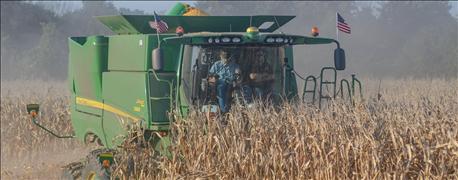
From planting to tilling to harvesting to haying and baling, many farmers and ranchers in Nebraska hire custom operators for various field operations. As profit margins get tighter, the prices paid for those services become more critical. But how have custom rates changed in the last two years?
The recently published 2016 Nebraska Custom Rates Survey summarizes the rates charged for specific machinery operations for the current year. The survey is conducted every other year by University of Nebraska-Lincoln's Department of Agricultural Economics.

FACTORS AFFECTING RATES: Jim Jansen, a UNL Extension educator in northeast Nebraska and one of the authors of the survey, notes this year's increases in average custom rates reflect the changing market dynamics for 2016 over 2014. A number of factors affect rates, including cost of diesel fuel, machinery and technology, topography and field layout, as well as the crop yield for that particular field.
While it's hard to make a general statement on custom rate averages, this year saw a few key increases in custom rates over 2014. As Jim Jansen, a UNL Extension educator in northeast Nebraska and one of the authors of the survey, notes, these increases reflect the changing market dynamics for 2016 over 2014.
For example, although the average cost of diesel fuel declined, the average labor rate increased, according to survey participants. "In 2014, it was noted the average labor rate was $15.58 per hour. In 2016, the average noted was $17.53," Jansen says. "On the fuel for 2014, we have an average reported $3.39 per gallon in the state of Nebraska. In 2016, we had an average reported price of $1.68. Custom rates reported as part of the survey assume wages as part of the quoted rate."
These are some of notable increases in average custom rates.
• Disking, primary: $12.94 to $14.77 per acre
• Field cultivating: $11.73 to $13.16 per acre
• Drilling soybeans: $14.75 to $17.76 per acre
• Planting row crops with row cleaners: $18.31 to $18.91 per acre
• Combining irrigated corn, including tractor and grain cart: $36.28 to $36.96 per acre
• Combining dryland corn, including tractor and grain cart: $33.40 to $36.45 per acre
• Combining soybeans, including tractor and grain cart: $34.86 to $36.64 per acre
A number of factors influence how custom rates are calculated in a given year. Jansen notes a big piece of the puzzle is new equipment and technology. "The size and scale of the equipment is an important thing to remember due to the fact that you can cover a lot of acres with modern equipment," he says. Meanwhile, with new, updated technology come higher capital outlays, reflecting higher rates. "What's being reported, the kind of equipment, might have an influence in the rates we see across the state."
Topography and field layout also have a big impact on rates, and this varies from location to location, notes Jansen. "Many respondents indicated the configuration of the fields was a factor," he says. "A nice square quarter with no wet spots and no ditches, versus a chopped-up 80 with a couple grass strips for erosion control — the differences in those can be seen in the rates."
Another factor is yield — and dryland yields in particular vary from one part of the state to the next, and custom rates reflect that. "If you're harvesting 100- compared to 200-bushel-per-acre dryland corn, you're putting twice as much yield through the machine," Jansen explains. "The custom rate may reflect these yield differences due to the additional wear on the machine and the number of acres able to be covered per hour."
The survey divides custom operations into two sections. Part I includes spring and summer operations like tillage, planting and harvesting of small grains. Part II includes information about fall and miscellaneous operations. Custom rates reported include charges for the use of necessary equipment, fuel, labor and supplies such as baling wire or twine provided by the custom operator. Seed, fertilizer and chemical costs are not included.
Read the full summaries at farm.unl.edu/customrates. For additional information, contact Jansen at [email protected].
About the Author(s)
You May Also Like






